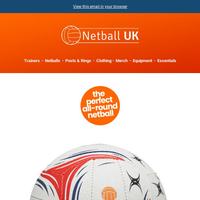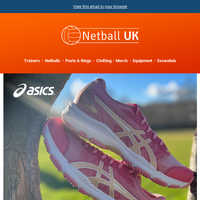|
Top Tips 🏐 Caring for your Netballs The biggest brands at the best prices View this email in your browser Trainers • Netballs • Posts & Rings • Clothing • Merch • Equipment • Essentials As we emerge from winter (fingers crossed, anyway), we start to hear more and more from you about having problems with your netballs. We were sent the above image from one of our customers of one of their older netballs which had been overinflated and, well, as you can see - the ball's not happy. It seemed like a good time to remind you of our top tips for getting the most out of your netballs, keeping them in the best condition for as long as possible, and ensuring we give them the attention they deserve. You can't be your best on court if you're using a ball that has seen better days. So, as we all train, play, coach and umpire here at Netball UK, we've put together these helpful hints and tips on what to choose and to prolong the life of your netball. 🏐 TOP TIP: Don't Over Inflate Given the picture we were sent, this seemed like a good place to start... We know it can be really hard to know when to stop - but if you put too much air in there's nowhere for it to go and it can lead to stitching splitting (as seen in this photo we were sent by another customer!) You want your netballs to be firm not rock hard so it's always better to under-inflate then you can add more air if needed, rather than keep going which can lead to damage. 🏐 TOP TIP: Keep Them Clean Clean your netball after use, wipe away any dirt or grass using warm water, a light detergent and a soft cloth, then wipe it dry. Don’t use detergents that contain bleach as this can damage the material of the outer covering and the stitching. If the ball gets wet during play, it should be dried in an airy place and not force dried with heat as this may damage the ball. 🏐 TOP TIP: Avoid A Weak Bladder A good tip for life generally, but for netballs in particular - most matchballs will feature a performance airloc or butyl bladder, this will give you the ultimate air retention saving your biceps having to pump up your netball constantly. Cheaper netballs, usually the recreational or training netballs typically have a latex rubber bladder which is softer but allows air to escape more quickly. 🏐 TOP TIP: Storing Your Netball Store them in a dry environment with good ventilation, a mesh style ball bag is recommended enabling any existing moisture to escape. And, never store in direct sunlight as this can harden the surface. 🏐 TOP TIP: Invest & Save Like anything in life, the more you pay the better you get which is absolutely true with netballs. The more you invest the better grip, backing (inside the netball) and most importantly better air retention. Don’t try to get away with a cheaper training or recreational netball, you are better off with an actual matchball for playing matches. The grip on the majority of training netballs is only made up of approximately 70% polyester fibres with about 30% of a chalk-like substance. When you are buying, the grip may feel more ‘positive’ and ‘grippy’ however, it will wear away more quickly than matchballs made up of 100% polyester fibres. We hope you have found our advice useful and it will help you invest in your netballs to invest in your performance. If you have any other questions, why not get in touch and any of our expert team will be happy to help. Shop all our Netballs now >> Shop everything you need for netball at Netball UK >> SHOP TRAINERS >> SHOP NETBALLS >> SHOP POSTS >> SHOP CLOTHING >> SHOP MERCH >> SHOP EQUIPMENT >> Copyright © 2024 Netball UK, All rights reserved. Our mailing address is: Netball UK, Netball House, Pennant Street, Oldham OL1 3BS Want to change how you receive these emails? You can update your preferences or unsubscribe from this list.















